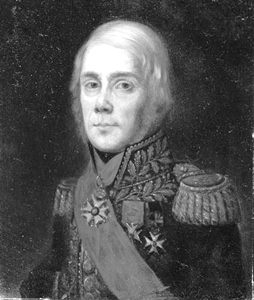General Augustin Gabriel d'Aboville

Born: March 20, 1773
Place of Birth: La Fère, Aisne, France
Died: August 15, 1820
Place of Death: Paris, France
Pronunciation:
The son of General François Marie d'Aboville, Augustin Gabriel d'Aboville entered the army in May of 1789 as a sous-lieutenant in the artillery regiment of Toul. Four months later he was enrolled in the artillery school of Châlons and he left there as a lieutenant in February of 1792. D'Aboville's first combat came soon when he served at Courtrai and he then became an aide-de-camp to his father in September of 1792. Two months later he was promoted to capitaine, and then in 1794 he joined the Army of the Sambre and Meuse. In 1795 he rejoined his father as an aide-de-camp and he remained in this position for the next few years. In 1799 d'Aboville joined the Army of the Danube and he served at Stockach that March. The next year he was promoted to chef de bataillon and he was named deputy director of the artillery at Mainz. In 1800 d'Aboville served with the Army of the Reserve at the crossing of the Great Saint Bernard pass and afterwards he served at the crossing of the Mincio, the crossing of the Adige, and then at the Siege of Verona.
In February of 1801 d'Aboville was named deputy director of artillery at Paris and then that May he was named to the central committee of artillery. In October he was named inspector of the manufacture of arms at Roanne and then in 1802 he returned to the position of deputy director of artillery at Paris. D'Aboville was sent to Holland in 1803 where he was ordered to put Vlissingen and Zealand in a state of defense. Next he was named major in the 2nd Foot Artillery and then at the end of 1804 he was named director of the artillery park of the Army of the North in Holland. D'Aboville received a promotion to colonel and in April of 1805 he took command of the 1st Foot Artillery. As the Grande Armée confronted the Third Coalition in 1805, d'Aboville served with the II Corps under General Marmont. In 1807 he joined the Army of Italy and he was named imperial commissary for the administration of powders and saltpeter.
Colonel d'Aboville was next sent to Portugal at the end of 1807. He distinguished himself in the crossing of the Tagus River and at the action of Evora. In August of 1808 d'Aboville commanded the artillery of Loison's division at the Battle of Vimeiro . He briefly returned to France before returning to Spain to join Marshal Soult's II Corps. D'Aboville went on to fight at Betanzos and he commanded the artillery reserve at the Battle of Corunna . In February of 1809 he successfully defended Tuy, protecting 1200 patients in hospitals, and then the following month he was promoted to général de brigade. That April d'Aboville took command of the artillery of I Corps in Spain and then in July he served at the Battle of Talavera . The next year he served at the Siege of Cadiz where he seized the fort of Matagorda. A month later d'Aboville was named a Commander of the Legion of Honor and then in August he was named commander of the artillery school of Metz. However, he remained in Spain and while serving at Cadiz he was hit by the same cannon shot that killed General Senarmont. With Senarmont's death, d'Aboville took command of the artillery at the Siege of Cadiz. In March of 1811 he served at Chiclana and then at the end of 1811 he served at the Siege of Tarifa. In 1812 d'Aboville was named a Baron of the Empire and in 1813 he became director general of the artillery parks of the Army of Spain and Army of Portugal. That June he took part in the Battle of Vitoria where he lost the greater part of the artillery park. For this d'Aboville was put on leave less than two weeks later, but he was recalled in October to prepare the forts between the Rhine and the Meuse in the département of Nord. In December of 1813 he was named commander at Lille.
After Napoleon's abdication in April of 1814, the restored Bourbons named d'Aboville a Knight of Saint Louis and commissary for the administration of powders and saltpeter. He did not take part in the Hundred Days of 1815 when Napoleon temporarily resumed power.
Bibliography
Related Pages:
Updated January 2023
© Nathan D. Jensen